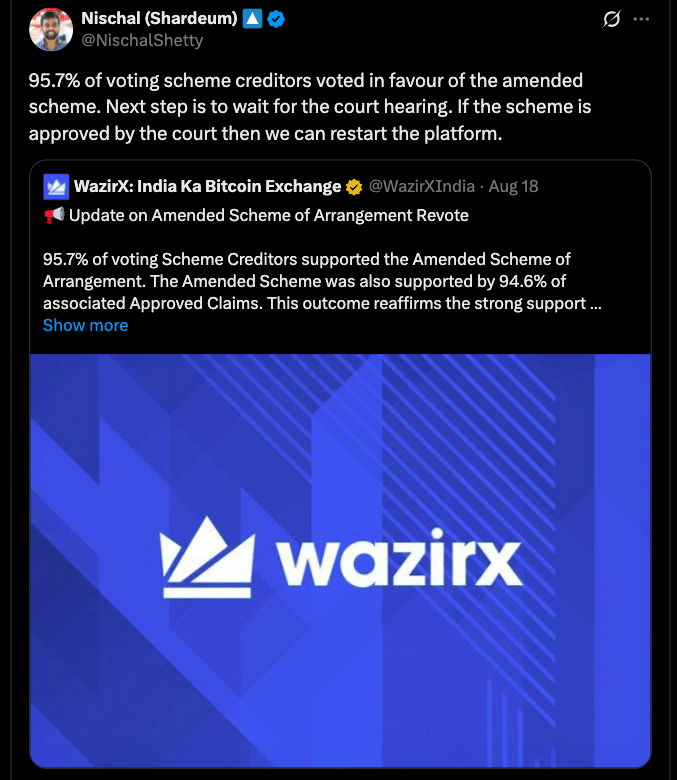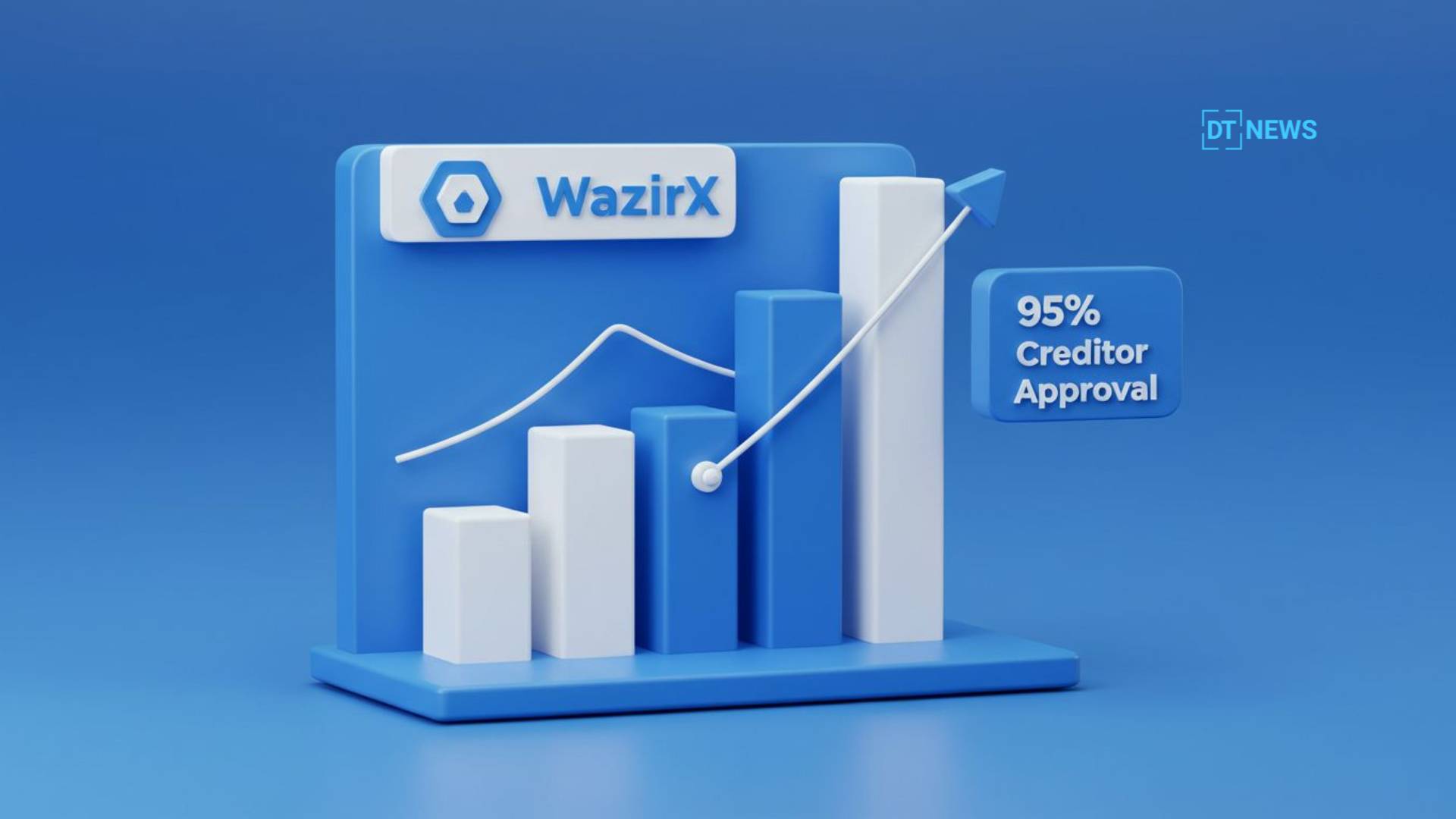Based on available data, WazirX, the troubled crypto exchange, has been trying to deliver on its promise to users affected by the $234 million hack. Over 95% of voting creditors have approved the revised WazirX restructuring plan, hoping this could be the breakthrough. If the Singapore High Court gives the go ahead, operations could restart and payouts could begin soon.
- From Court Rebuke to Thumping Approval
- What’s Changed: Structure, Jurisdiction and Oversight
- Backstory of the Hack and the Long Road to Recovery
- What’s Next: Court Approval and Legal Pressure
- Why This Matters
- Conclusion
- FAQs
- What did creditors just vote on?
- Why was the first plan rejected?
- What happens now?
- What if the court rejects again?
- Glossary
WazirX founder Nischal Shetty has said that once the plan is in effect, compensation will start within 10 days, much faster than the earlier estimate of 2-3 months.
From Court Rebuke to Thumping Approval
The initial plan approved by creditors in April was rejected by the Singapore High Court in June over concerns about recovery tokens and proposed digital token regulations. WazirX appealed and got a court order to have another vote.
Between late July and early August, over 150,000 creditors, representing over $206 million in claims, voted again and approved the revised proposal by a landslide.

What’s Changed: Structure, Jurisdiction and Oversight
At the heart of the revised proposal is a change in who manages compensation. Previously, WazirX parent Zettai, based in Singapore, was to manage recovery through token repurchases using exchange profits. Now, the role will be managed by Zanmai India, a company registered under India’s Financial Intelligence Unit.
This addresses regulatory concerns and provides a clearer jurisdiction. WazirX also created a new Panamanian subsidiary called Zensui, to house cryptocurrency operations to navigate international compliance.
Backstory of the Hack and the Long Road to Recovery
The saga began in July 2024 when North Korean affiliated hackers known as the Lazarus Group reportedly drained $234 million from WazirX’s multisignature wallet. Withdrawals were paused, trust was lost and the exchange filed for moratorium under Singapore’s Companies Act.
The initial plan approved by the High Court in January 2025 was to issue recovery tokens, launch a decentralized exchange and buybacks from platform revenue. Users would get up to 80-85% of their hashed portfolio values within 10 business days; with the rest covered through token buybacks.
The plan was however rejected in June when the court raised concerns over transparency and distribution mechanics.
What’s Next: Court Approval and Legal Pressure
The fate is in the hands of the Singapore High Court. If it approves the WazirX restructuring plan, user withdrawals and trading can resume soon. But the complexity deepens with increased legal heat as India’s Delhi High Court has ordered Zettai to submit Binance acquisition documents and court filings, raising questions over structural transparency.
User frustration is high. Some are worried that long-term users who held unaffected tokens will lose out as prices have risen since the hack. Others are demanding legal action. The Supreme Court of India declined to rule on crypto policy in April citing jurisdiction limitations but has indicated support for creditor rights and oversight.

Why This Matters
This matters a lot for Indian crypto users and global digital asset recovery. A successful restructuring means a big exchange can recover from a hack through cooperative, court-supervised means.
But failure or delay means users will be pushed towards liquidation which experts say yields lower recovery and could stretch till 2030; especially with token valuations and asset tracing complexities.
Conclusion
Based on the latest research, WazirX restructuring plan is at a very important decision-making moment. With 95% of creditors approving the amended scheme and faster payouts and services, WazirX may be closer than ever to redemption.
However, it all depends on the Singapore High Court’s decision. If approved, it will be a rare success story in crypto crisis recovery.
For in-depth analysis and the latest trends in the crypto space, our platform offers expert content regularly.
Summary
WazirX has got 95% creditor approval for a revised restructuring plan to compensate users after a $234 million hack. The amended scheme will have payouts managed by a regulated Indian entity, Zanmai India and will compensate users within 10 days of court approval. After an earlier court rejection, this is a positive move; but success now depends on Singapore High Court sanction.
FAQs
What did creditors just vote on?
They approved a revised restructuring plan that will compensate hack-affected users with payments managed by Zanmai India upon court approval.
Why was the first plan rejected?
The Singapore High Court rejected it in June over transparency and regulatory issues, delaying any payouts.
What happens now?
WazirX waits for court approval. If approved, WazirX will resume operations and compensate users within 10 days.
What if the court rejects again?
Liquidation becomes a risk which could delay and reduce payouts; even into 2030, according to WazirX warnings.
Glossary
Restructuring Plan – A court-supervised recovery scheme where a company can reorganize its liabilities and repay creditors, usually to avoid liquidation.
Recovery Tokens – User claims in digital form; holders will get periodic buybacks from company profits or recovered assets.
Moratorium – Legal protection for creditors from pursuing claims during restructuring, giving the company time to reorganize.
Liquidation –Sale of assets under court supervision, usually yields lower recovery for creditors and longer timelines.






































